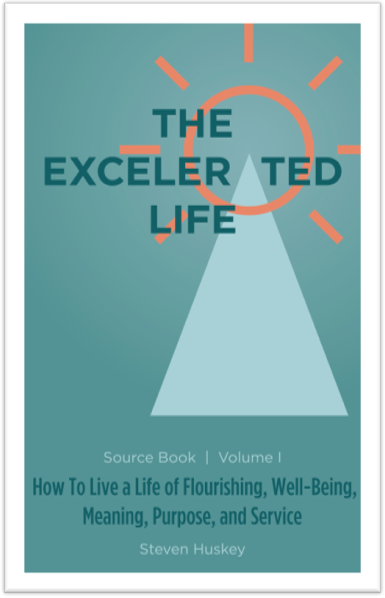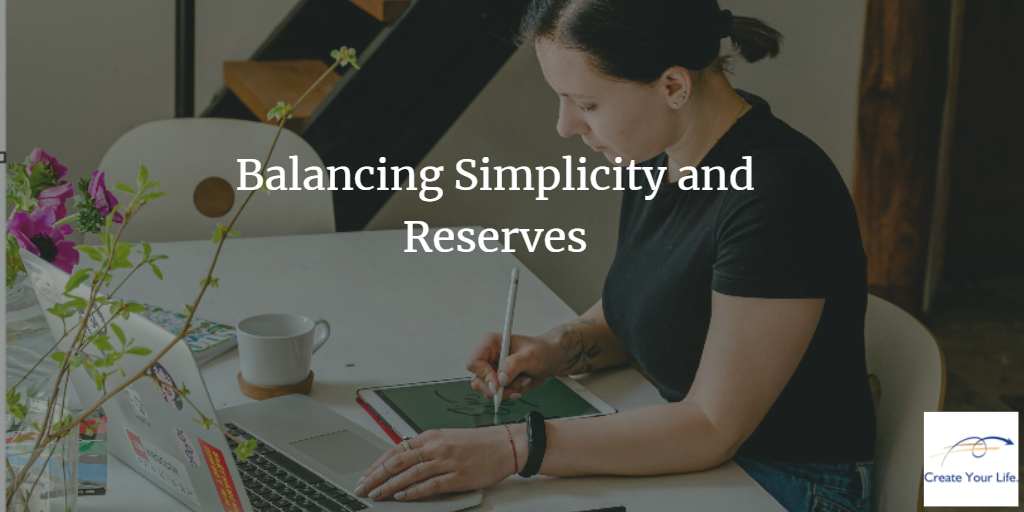Integrating the concept of keeping reserves with voluntary simplicity involves finding a balance between simplicity and preparedness. You can live a simple life while still maintaining sufficient reserves. This balanced approach allows you to live simply, sustainably, and prepared for whatever life may bring.
A Balancing Act
An acquaintance said to me recently, “Steven, I don’t get it. You claim to be a minimalist, yet you talk about keeping extra household supplies and other stuff. How can you do both? It doesn’t add up.”
With due respect to my friend, I don’t claim to be a minimalist. I do, however, strive to follow the concept and practices of “voluntary simplicity”, especially within the Excelerated Simplicity™ practice, which is aimed at “freeing yourself from unnecessary complexity”. This could involve minimalism, but that is a personal choice and not specifically required for living a simple life.
And my friend is correct. You and I do talk at times about keeping Excelerated Reserves™ of supplies as well as reserves of time, money, energy, love, and other resources. It is the way we move from a scarcity mindset to abundance.

Both practices are important in embracing an Excelerated Life™ and they are not mutually exclusive. It is possible and proper to adopt a life of simplicity while keeping enough reserves on hand that we are able to move up Maslow’s hierarchy of needs from basic physical and safety needs to the higher levels toward self-actualization.
Integrating the concept of keeping reserves with voluntary simplicity involves finding a balance between simplicity and preparedness. Let’s explore ways you can live a simple life while still maintaining sufficient reserves. We’ll consider reserves of supplies, time, money, energy and health, and love. And we’ll look at how and why a life of simplicity can include reserves in these areas.
Identify Essential Supplies
Keep a supply of non-perishable goods such as canned food, dry goods, and household essentials. These items can serve as reserves during emergencies or times when access to stores may be limited. Remember, you aren’t stockpiling inventory simply for the sake of amassing possessions. As Thomas Leonard said, “You just want to be so well supplied that you will be able to lead a terrific life far enough beyond the reach of scarcity.” [Leonard]
For simplicity’s sake, keeping a reserve of supplies presumes you have identified what is essential for you. It doesn’t mean stockpiling items “just in case” you may need them someday. So first, determine the essential items you need to maintain a simple lifestyle. These could include basic food staples, household essentials, and other items necessary for daily living. Then begin to collect them so that you feel the need is met in those areas and you are freed to focus on other things.
Use Time Well
It goes without saying, but let’s say it anyway: There are twenty-four hours in a day. You cannot have more. Jim Rohn once said, “Time is more valuable than money. You can get more money, but you can’t get more time.” Or to put it another way, you can use your time to make money, but you cannot use your money to buy time. Well, that isn’t precisely true – you can use your money to buy other peoples’ time, leaving you to use your own resource of time in a different way.
So to build a reserve of time, simplify the things you must do. Know what your priorities are and focus as much as possible on them. Practice effective time management to make the most of your available time and energy. Prioritize tasks based on importance and allocate time (your reserves) for rest and relaxation to prevent burnout.
Use some of your money to buy the time of others to do tasks that are not your high priority. Grant Cardone said that Elon Musk should never wash his own Tesla. Even if he likes washing cars, his time is far too valuable. [Cardone] What are the things you shouldn’t be doing with your precious, finite time? Those are the things to think about hiring others to do.
Handle the Money
Of course, hiring other people requires that you have financial reserves. Having a financial reserve provides peace of mind and reduces stress during challenging times. Here are some ways to simplify your finances and build a reserve.
First, build an emergency fund. Set aside a portion of your income for an emergency fund to cover unexpected expenses or financial setbacks. Work toward saving 10% of your income. You may not be in a position to do that starting out, but save something, even 1% or 0.5%. In the beginning, the amount isn’t as important as the practice of saving consistently. As we often say, consistency is key. Gradually, you may be able to increase your income and cut back on spending, especially as you move toward simplicity and begin buying fewer items. Then, as you are able, put more money into your emergency fund. Aim for a goal of six to nine months of expenses. (Of course, this presumes that you make the effort to know what all your expenses are.)
One idea for cutting back on expenses is to embrace self-sufficiency. Explore ways to become more self-sufficient by growing your own food, learning practical skills, and reducing reliance on external resources. By becoming less dependent on external systems, you can add to your financial reserves.

Maintain Physical and Mental Health
“This is a fundamental tenet of simple living. Discard your attachments. Let go of assumptions. Reduce your possessions. Living simply is also about discarding your physical and mental burdens.” ~ Shunmyo Masuno
Prioritize self-care by adopting healthy lifestyle habits such as regular exercise, balanced nutrition, adequate sleep, and stress management techniques. Living simply allows you to make gains in these areas. Maintaining reserves of health ensures you have the energy and resilience to handle life’s challenges.
All You Need Is Love
Actually, despite this claim by The Beatles, love isn’t all you need, but it is definitely one of the top things. An excellent reason for simplifying your life is to have more time to spend with those you love. So cultivate relationships.
Invest time and energy in nurturing your relations with family, friends, co-workers, and community members. Building strong social connections provides emotional support and creates a network of people you can rely on during challenging times. Clearly a reserve worth having.
Quality Over Quantity
When you are determining what is essential for you, keep these words from Shunmyo Masuno in mind: “Simplicity is about stripping away what is not useful. Determine whether something is truly necessary, and if it is, then take good care of it.” [Masuno]
Instead of accumulating numerous possessions, focus on acquiring high-quality items that are durable and long-lasting. Investing in quality goods reduces the need for frequent replacements and minimizes clutter. Here are two ideas to keep in mind.
- Before you buy something, discard something.
- For something you truly need, buy the best you can afford.
“Living simply,” says Masuno, “means that the mug you use every day for coffee is a mug that you really like – one that you take good care of and that you use for a long time. Acquire only good things that will truly be needed.” A reserve means having enough. When you have quality items and take really good care of them, that is enough.
Actions
- Pick an area – supplies, time, money, energy, health, love – where you are lacking reserves. Like many of us, you may have several areas. Select the one that would be most beneficial for you at this time.
- Brainstorm ways to simplify in this area in a way that could help you build a reserve.
- Choose one of the ways that appeals to you and that is within your capability at this time.
- Break it down into small, easy-to-do steps.
- Take the first step.
- Continue taking steps until you have built a reserve in that area.
- Repeat as necessary.
Balancing Simplicity and the Need for Reserves
By integrating these practices into your life, you can enjoy the benefits of voluntary simplicity while also maintaining reserves of supplies, time, energy, health, love, and other resources. This balanced approach allows you to live simply, sustainably, and prepared for whatever life may bring.
By integrating the concept of keeping reserves with voluntary simplicity, you can live a simple life while still maintaining sufficient reserves. It’s another step on the path to embracing your Excelerated Life™!
Do you see a contradiction between living simply and having a reserve?
How might you reconcile this in the area of having enough supplies? Time? Money? Energy? Love?
Share your thoughts by leaving a comment below.
Excelerated Reserves™ — moving from scarcity to abundance — is one practice for creating your Excelerated Life™, a life of flourishing and well-being, and a life of meaning, purpose, and service.
Read more about the Excelerated Life™.
Resources:
Cardone, Grant. Be Obsessed or Be Average. New York: Penguin Random House LLC, 2016.
Leonard, Thomas. The 28 Laws Of Attraction. New York: Scribner, 1998.
Masuno, Shunmyo. The Art of Simple Living. New York: Penguin Life Books, an imprint of Penguin Random House LLC, 2009.
This blog post includes research information and suggestions provided by ChatGPT, an AI language model developed by OpenAI. The content was generated with AI assistance and is intended to provide information and guidance. Please note that the suggestions are not official statements from OpenAI. To learn more about ChatGPT and its capabilities, you can visit the OpenAI website.


